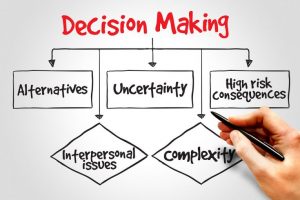Weekly Challenge

Decision Making
I think that there must be something in the air, but I have had several conversations this week with people who are struggling to make decisions. So, I thought decision making would be a good focus for my challenge this week.
The first critical point to remember:
Nobody sets out to make a bad decision
True, with the benefit of hindsight, some decisions turn out to be poor decisions but what that was not the intention. Rather when we make a decision that turns out to be a poor one, our focus needs to be on the process so that we can learn from the approach we took and adopt a different approach the next time.
The fact is we make that best decision that we can, with the information that we have, at the time. Every decision is constrained by these elements.
However, it is important to consider the process we adopt to arrive at a decision. Most of us have consistent pattern to that process. Here are three generic patterns that are common:
- Have a gut view and only seek out information that supports that view
- Research, research, research and get tons of information and hit overwhelm and avoid a decision
- Adopt the view of others whom you hold in high esteem rather than form your own view
I tend to alternate between the first and second depending on the situation. No one approach is the perfect approach. What is important is that we take the time to understand our own pattern and the pro’s and cons of the approach that we adopt. I will readily admit that I have made decisions that were good and that were very poor.
What life has taught me is that regardless of the particular outcome of a decision, time moves on and things do have a way of working out.
So, my challenge for you is to consider how it is that you make decisions. Take for instance selecting an item from a menu in a restaurant. Do you scan for something familiar and stick with that? Do you methodically consider each item? Do you pick an item and then weigh up everything else against that choice? Is this how you make all decisions?
Now, consider how you decide to look for a new job, go for a promotion, take on more responsibilities. Do you go with your gut without any real evaluation? Do you weigh up the pros and cons ad nauseum? Do you stress about elements that are outside of your control? For major decisions are you using a similar or a very different process?
Now consider decisions that turned out to be good, and those that turned out to be poor. Take the time to understand the processes that work most effectively for you. And the next time you need to make a major decision you can make the conscious decision to adopt the processes that work for you.
Warm Wishes
Mary Corbett
